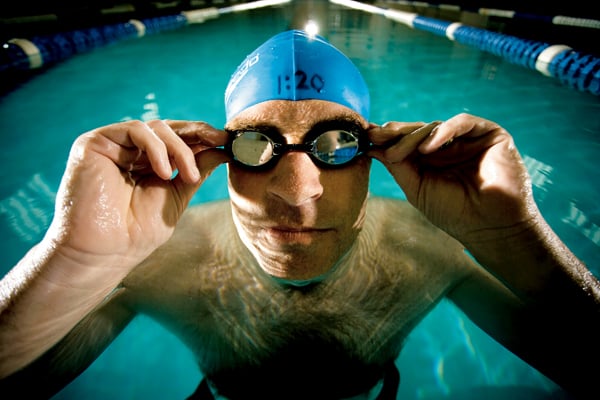“Want to break a minute-20 by the end of the summer?”
I would have laughed if I wasn’t about to throw up. I’d just finished a set of sprints in the pool at Army Navy Country Club, where coach Peter Karl runs a masters swim program. Though the sun was just coming over the horizon, I’d been in the water an hour and was gasping for air—a perfect moment, Peter decided as he stood above me, to throw down a challenge.
On my best day, I heaved myself through 100 meters in a minute and 30 seconds. I hadn’t swum competitively as a kid, and now, at 42, I was in Peter’s Sea Devils program only because my wife had made me. Still, I couldn’t shrug off his challenge. He was my coach.
My father was one of my first coaches. He’s a doctor of some renown, but he stood tallest in my eyes when on the baseball field, his hat pulled down over his eyes. I remember riding home after practice, the smell of leather, dust, and sweat filling our Volkswagen bug, enjoying the warmth of being close to him.
I played soccer for a string of coaches who couldn’t have been more different: Peter Noble, whose British accent and formal air made him seem like royalty to his grade-school players; Sam DeBone, the longtime coach at Bethesda’s Walt Whitman High famous for his bowlegs and an intensity that carried teams to state championships; Joe Amorim at Haverford College, a Portuguese immigrant and a man who had a master’s degree in philosophy and more than a few life lessons.
As we grow older, coaches are replaced by personal trainers and instructors. You’re the “client” who buys the services of “professionals” who may become friends but who never work their way into your soul.
Three years ago, an orthopedist showed me images from my second knee surgery and declared the joint kaput. “Go buy yourself some goggles,” he said.
I hated swimming at first. Peter Karl ignored my wife and me and had us work out in the diving well, apart from the others.
After the summer, I swam with an indoor Sea Devils program. Workouts started at 5 am and left me so weak that when I got to the office I couldn’t lift my arms to the keyboard. But because of Rory Lewis, I couldn’t quit.
Rory is another Sea Devils coach. Whippet thin, he’s about my age, plays rugby, and blasts jazz and pop during our workouts. He corrected my strokes with gentleness yet asked for mental toughness. His passion for swimming was such that I didn’t skip a workout without fearing I had disappointed him.
By the next summer at Army Navy, I was fit and no longer swam like a shipwreck victim. Peter noticed. He took interest in my workouts and early on set the goal of breaking 1:20.
With Peter’s help, I occasionally enjoyed the sensation great swimmers talk about—the feeling of skimming the water’s surface. When he preached to the teenagers in his elite program, I listened in and hung on his words.
On the last day, he announced a final time trial. I churned hard yet focused on making each stroke technically perfect. I didn’t want to let Peter down.
When I touched, the clock read 1:22. I slumped on the wall and buried my face in my arms.
“It’s okay,” he said. “You worked as hard as you could, and that’s all I can ask.”
Peter’s probably tossed off that bromide hundreds of times. But it had been years since I’d heard it. Next summer, I’ll break 1:20.
This article first appeared in the June 2009 issue of The Washingtonian. For more articles from that issue, click here.



















